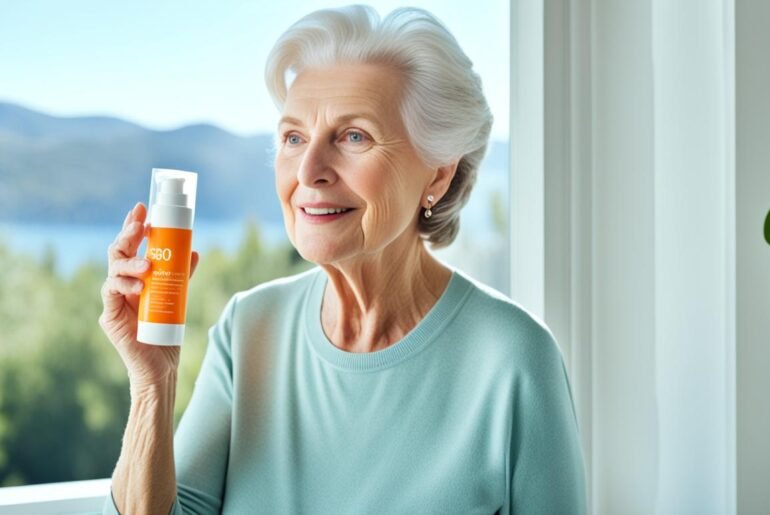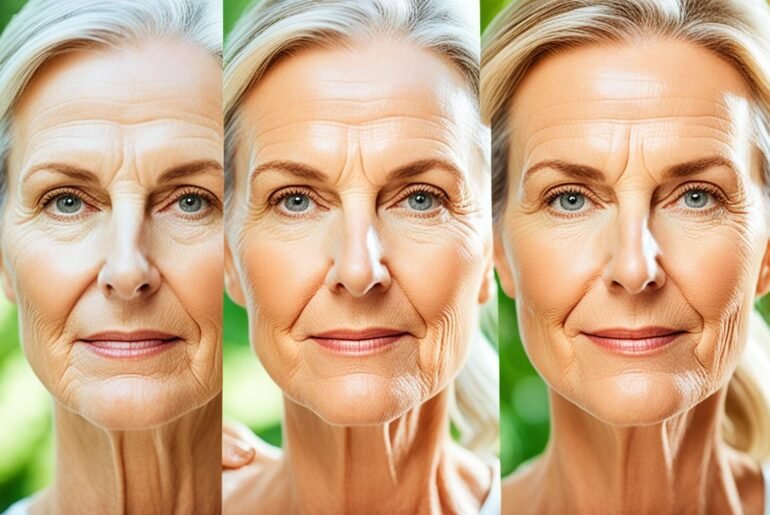Did you know that the majority of skin changes associated with aging are caused by the sun’s ultraviolet (UV) rays? That’s right, sun exposure is one of the primary factors that contribute to wrinkles, dark spots, and other signs of skin aging. Thankfully, there is a simple solution to slow down the aging process and protect your skin from the damaging effects of the sun: sunscreen.
Sunscreen is not just for beach days or sunny vacations. It should be an essential part of your daily skincare routine, regardless of the weather or the activities you have planned. By incorporating sunscreen into your anti-aging regimen, you can prevent sun damage, protect against UV rays, and maintain a youthful and radiant complexion.
Key Takeaways:
- Sunscreen is crucial for preventing skin aging caused by UV rays.
- Regular use of sunscreen can reduce the risk of wrinkles, dark spots, and other signs of aging.
- Choose a broad-spectrum sunscreen with a high SPF to ensure maximum protection.
- Incorporate sunscreen into your daily skincare routine, even on cloudy or winter days.
- Apply sunscreen generously and reapply every two hours or more frequently if you’re sweating or swimming.
How UV rays damage the skin
UV rays, specifically UVA and UVB, have detrimental effects on the skin by penetrating into the deeper layers and causing damage to the top layer known as keratinocytes. Prolonged exposure to UV rays can lead to actinic keratosis, a condition characterized by red, rough, and scaly skin.
Let’s take a closer look at how UV rays impact the skin:
The Role of UVA and UVB
UVA and UVB rays are different wavelengths of UV light that have varying effects on the skin. UVA rays are long-wave rays that penetrate deep into the skin, reaching the dermis, while UVB rays are short-wave rays that primarily affect the outermost layer, the epidermis.
Both UVA and UVB rays can cause DNA damage in the skin cells, leading to mutations and an increased risk of skin cancer. However, UVA rays are responsible for a higher percentage of UV-induced skin damage, including aging effects such as wrinkles, pigmentation, and loss of elasticity.
Damage to Keratinocytes
Keratinocytes are the most abundant cells in the epidermis and play a vital role in maintaining skin structure and function. When exposed to UV rays, these cells undergo various detrimental changes.
- UVB rays directly damage the DNA of keratinocytes, leading to the formation of pyrimidine dimers, which can disrupt normal cellular processes and increase the risk of actinic keratosis and skin cancer.
- UVA rays generate reactive oxygen species (ROS) within the skin, causing oxidative stress and accelerating skin aging. ROS can also induce gene mutations and impair collagen production, further contributing to skin damage.
Actinic Keratosis: A Consequence of UV Exposure
Actinic keratosis is a common skin condition that arises due to long-term sun exposure. It appears as rough, scaly patches on sun-exposed areas of the skin, such as the face, ears, scalp, and backs of the hands.
These precancerous lesions are the result of cumulative UV damage to the skin’s DNA, especially from UVB rays. Although actinic keratosis is considered a pre-cancerous condition, the risk of developing squamous cell carcinoma is relatively low.
It is crucial to protect the skin from UV damage to prevent the development of actinic keratosis and other sun-induced skin conditions.
“Prolonged exposure to UV rays can lead to actinic keratosis, causing the skin to become red, rough, and scaly.”
| UV Rays | Effects on the Skin |
|---|---|
| UVA |
|
| UVB |
|
The role of sunscreen in preventing skin aging
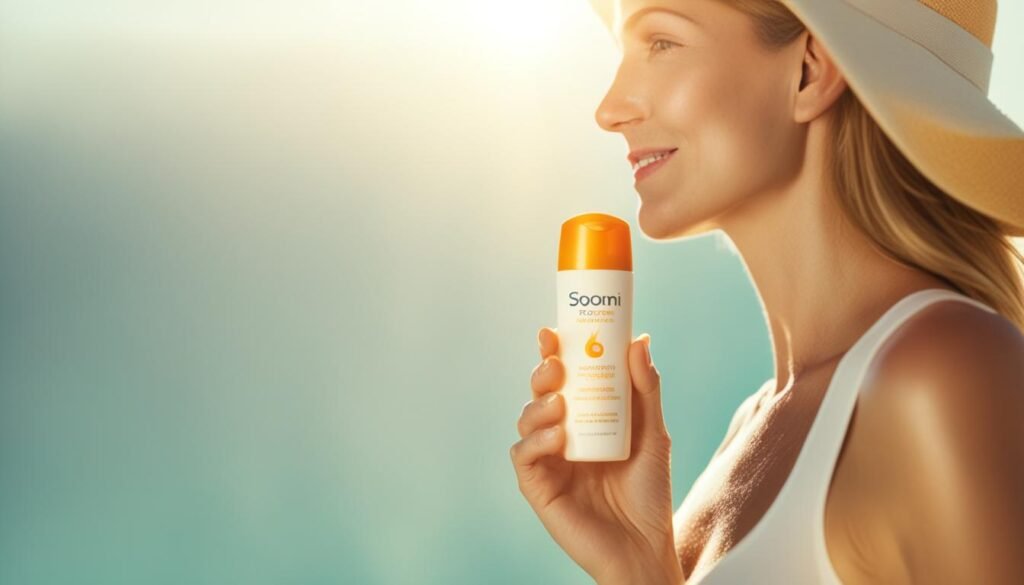
When it comes to keeping your skin youthful and healthy, sunscreen is a non-negotiable component of your skincare routine. Not only does it protect your skin from the harmful effects of UV rays, but it also plays a crucial role in preventing premature skin aging.
The Importance of Sunscreen
Sunscreen acts as a shield against UV damage, which is one of the primary causes of skin aging. Regularly using sunscreen offers several key benefits in the fight against aging:
- Blocks Harmful UV Rays: Sunscreen forms a barrier on the skin that helps to block both UVA and UVB rays, preventing them from penetrating deep into the layers of your skin.
- Reduces Risk of Sunburns and Skin Cancer: Sunburns and skin cancer are not only painful and dangerous but can also speed up the aging process. Sunscreen helps minimize the risk of these harmful effects.
- Minimizes Visible Signs of Aging: Wrinkles, brown spots, and visible blood vessels are common signs of aging caused by UV damage. Sunscreen can help minimize and prevent the appearance of these visible signs, keeping your skin looking youthful and vibrant.
By incorporating sunscreen into your daily skincare routine, you are taking a proactive step in preserving your skin’s health and preventing premature aging.
The importance of sunscreen and moisturizer
When it comes to anti-aging products, two essentials recommended by dermatologists are sunscreen and moisturizer. Let’s take a closer look at why these two products play a crucial role in any skincare routine.
Sunscreen
Sunscreen is your first line of defense against the damaging effects of the sun. It provides protection from harmful UV rays, which are the primary cause of premature skin aging. By applying sunscreen daily, you can significantly reduce the risk of sunburns, skin damage, and the development of wrinkles.
It is essential to choose a broad-spectrum sunscreen that offers protection against both UVA and UVB rays. Look for a product with a minimum SPF (Sun Protection Factor) of 30, as recommended by dermatologists.
Moisturizer
Moisturizer plays a vital role in maintaining skin health and preventing the signs of aging. As we age, our skin loses moisture and elasticity, leading to the appearance of fine lines and wrinkles. By using a moisturizer regularly, you can help replenish the skin’s moisture barrier and keep it hydrated.
Look for a moisturizer that suits your skin type—whether you have oily, dry, or combination skin. Opt for a lightweight, non-comedogenic formula that won’t clog pores. A moisturizer with added anti-aging ingredients, such as hyaluronic acid or retinol, can provide additional benefits for aging skin.
Why Use Sunscreen and Moisturizer Together?
Using sunscreen and moisturizer together is a winning combination for healthy, youthful-looking skin. Sunscreen protects your skin from UV damage, while moisturizer ensures that your skin stays hydrated and supple. These two products work hand in hand to safeguard your skin’s overall health and minimize the visible signs of aging.
It’s important to incorporate sunscreen and moisturizer into your daily skincare routine. Apply sunscreen as the final step of your skincare regimen, after cleansing, toning, and moisturizing. Remember to reapply sunscreen every two hours, especially if you’re spending time outdoors or engaging in activities that make you sweat.
| Sunscreen | Moisturizer |
|---|---|
| Provides protection against harmful UV rays | Hydrates the skin and replenishes moisture |
| Reduces the risk of sunburn and skin damage | Improves the skin’s texture and elasticity |
| Prevents premature skin aging | Minimizes the appearance of fine lines and wrinkles |
Incorporating sunscreen and moisturizer into your daily skincare routine is an effective way to keep your skin protected, hydrated, and looking its best. Remember, consistency is key for optimal results.
Targeting specific aging concerns
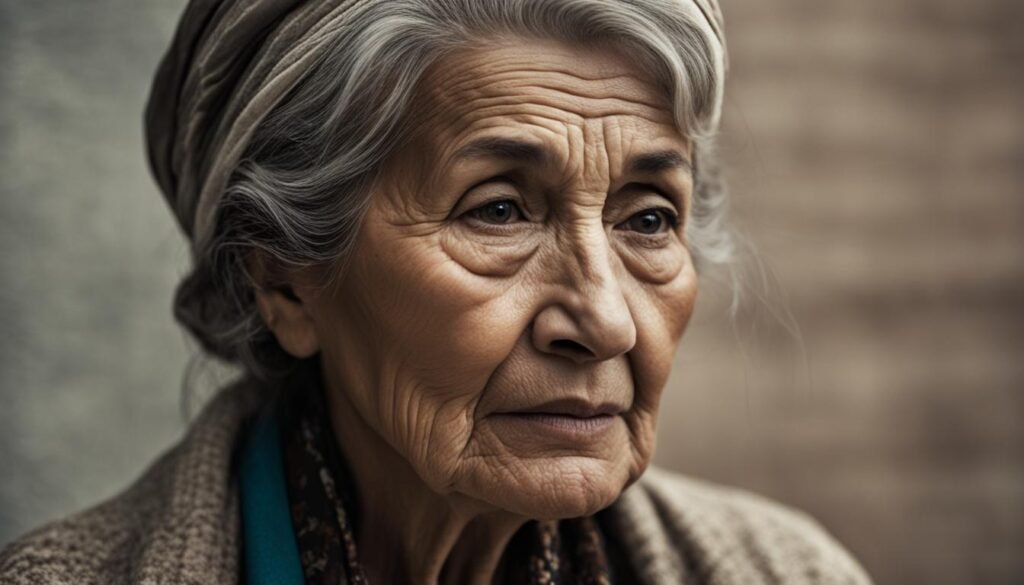
When it comes to addressing aging skin concerns, it’s important to target specific issues like wrinkles and dark spots. While there are numerous anti-aging products available, focusing on one concern allows for more effective and targeted treatment.
“By directing your efforts towards specific concerns, you can tailor your skincare routine to address those particular needs,” explains Dr. Emily Johnson, a renowned dermatologist.
Wrinkles are a common concern associated with aging skin. These fine lines and creases develop due to a combination of factors, including the loss of collagen and elastin, sun damage, and repetitive facial expressions. To combat wrinkles, look for anti-aging products that contain ingredients like retinol, peptides, and hyaluronic acid, known for their potential to improve the appearance of wrinkles.
Dark spots, also known as hyperpigmentation, are another common concern. These patches of skin discoloration can be caused by factors such as sun exposure, hormonal changes, and aging. Products containing ingredients like vitamin C, niacinamide, and hydroquinone can help fade dark spots and even out skin tone.
“It’s important to note,” advises Dr. Johnson, “that no single product can address all signs of skin aging. However, by targeting specific concerns, you can effectively improve the appearance of your skin.”
A Comparison of Anti-Aging Products
| Product | Key Ingredients | Targeted Concern |
|---|---|---|
| Retinol Serum | Retinol, hyaluronic acid | Wrinkles, fine lines |
| Vitamin C Serum | Vitamin C, hyaluronic acid | Dark spots, uneven skin tone |
| Peptide Cream | Peptides, niacinamide | Collagen production, firmness |
Remember, it’s essential to incorporate these targeted products into a comprehensive skincare routine that includes cleansing, toning, and moisturizing for optimal results. Additionally, don’t forget to use sunscreen daily to protect your skin from further damage and prevent the worsening of aging concerns.
In the next section, we’ll delve into selecting products based on your specific skin type and how to have realistic expectations when using anti-aging products.
Choosing products for your skin type
When it comes to skincare, selecting products that are suitable for your specific skin type is essential for achieving the best results. Different skin types have different needs, and using the right products can help address your unique concerns and enhance the overall health and appearance of your skin.
If you have oily skin, it’s important to choose products that are specifically formulated to control excess oil and prevent breakouts. Look for moisturizers that are lightweight, non-greasy, and oil-free. These products can help regulate sebum production and keep your skin matte throughout the day.
For those with sensitive skin, it’s crucial to opt for products that are gentle and hypoallergenic. Hypoallergenic products are designed to minimize the risk of allergic reactions and irritation, making them ideal for sensitive skin types. Non-comedogenic products are also beneficial as they are less likely to clog pores and cause acne breakouts.
By using hypoallergenic and non-comedogenic products, you can minimize the chances of experiencing adverse reactions and maintain the health and comfort of your sensitive skin.
Key Considerations when Choosing Products for Your Skin Type:
- Select moisturizers formulated for oily skin if you have an oily complexion.
- Look for products labeled as hypoallergenic and non-comedogenic for sensitive skin.
- Be aware of any specific ingredients to avoid for your skin type, such as fragrances or certain oils.
- Perform a patch test on a small area of your skin before using a new product to check for any adverse reactions.
Choosing products tailored to your skin type can help optimize their effectiveness and ensure a healthier, more balanced complexion.
Realistic expectations for anti-aging products

When it comes to anti-aging products, it’s important to approach them with realistic expectations. While these products can certainly help improve the appearance of your skin and minimize signs of aging, it’s essential to understand that exaggerated claims of instant results or complete reversal of aging signs are often too good to be true.
Many anti-aging products on the market may be labeled as “clinically proven,” indicating that they have undergone testing on consumers. However, it’s important to note that this doesn’t necessarily mean they have undergone rigorous FDA clinical trials. Clinical trials conducted by reputable organizations provide more reliable evidence of a product’s effectiveness.
“Remember, no product can completely reverse the aging process, but certain ingredients have been shown to provide visible improvements over time.”
While anti-aging products can offer noticeable benefits, it’s crucial to have reasonable expectations. Results may vary depending on factors such as individual skin type, age, and lifestyle. Patience and consistency are key as it can take time for products to show their full effects.
Realistic expectations versus exaggerated claims
It’s important to distinguish between realistic expectations and exaggerated claims when considering anti-aging products. Here are some examples to help guide your decision-making process:
- Exaggerated claim: “Eliminates all wrinkles in just one week!”
- Realistic expectation: “Reduces the appearance of fine lines and wrinkles over time.”
- Exaggerated claim: “Turn back the clock and look 10 years younger instantly!”
- Realistic expectation: “Improves skin firmness and elasticity for a more youthful appearance.”
- Exaggerated claim: “Complete reversal of all signs of aging with one product!”
- Realistic expectation: “Targets specific aging concerns such as dark spots or uneven skin tone.”
By setting realistic expectations and understanding the limitations of anti-aging products, you can make informed choices and adopt a skincare routine that aligns with your desired outcomes.
| Expectation | Reality |
|---|---|
| Instant and dramatic results | Products typically require consistent use over time for visible improvements |
| Complete reversal of aging signs | No product can completely reverse the aging process |
| Clinically proven claims | May not have undergone FDA clinical trials |
Set realistic expectations and enjoy the journey
Remember that while anti-aging products can be beneficial in your skincare routine, they are not miracles in a bottle. Understanding the science behind these products and managing your expectations will help you make informed choices and appreciate the journey towards healthier, more youthful-looking skin.
Considering price range when choosing products
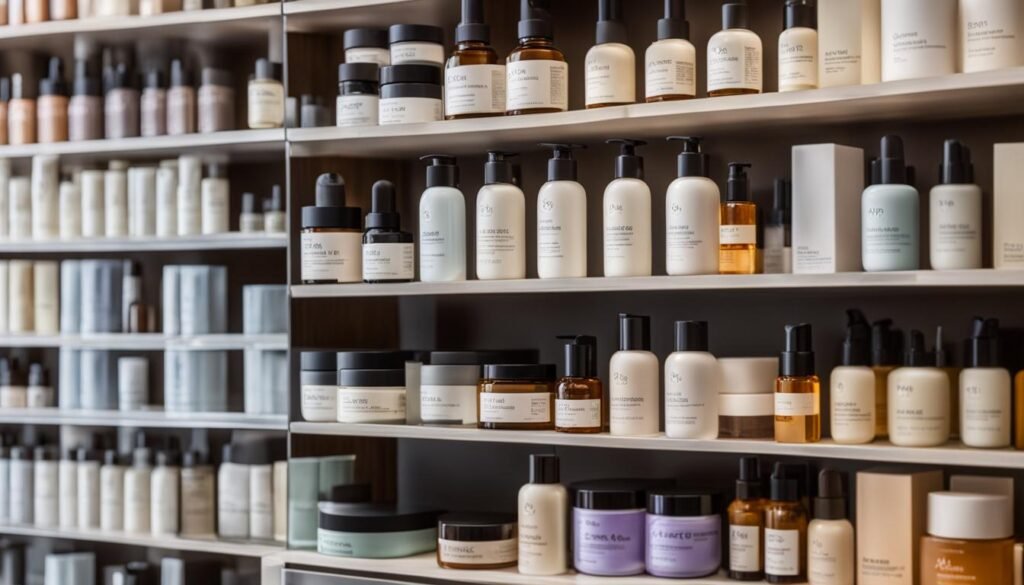
When it comes to selecting anti-aging products, many people believe that the higher the price, the better the results. However, the truth is that effective anti-aging options can be found across various price ranges. It’s important to consider the affordability of products without compromising their effectiveness.
Investing in skincare shouldn’t break the bank. There are affordable options available that can deliver significant improvements to the skin’s appearance and help combat the signs of aging. By exploring products within different price ranges, you can find options that fit your budget while still providing the desired results.
Remember, the key to finding the right anti-aging product isn’t solely based on its price. Factors such as the ingredients, formulation, and customer reviews also play a crucial role in determining its effectiveness. Don’t overlook affordable options, as they can offer excellent results without the hefty price tag.
When considering the price range, it’s important to remember that expensive doesn’t always mean better. Instead of solely focusing on the cost, take into account the overall value of the product and how it aligns with your skincare needs.
“The effectiveness of an anti-aging product should never be solely judged by its price. Quality and results can be found across different price ranges, making it crucial to consider both affordability and effectiveness when making your purchase decision.” – Dermatologist Sara Johnson
So, don’t let the price deter you from exploring affordable anti-aging products. By doing your research and understanding the ingredients and formulation, you can find high-quality options that deliver excellent results without breaking the bank.
Key takeaways:
- Effective anti-aging products come in various price ranges.
- Don’t assume that more expensive products are always better.
- Consider the affordability of products without compromising their effectiveness.
- Explore affordable options that can deliver significant improvements to the skin’s appearance.
- When evaluating a product, focus on its ingredients, formulation, and customer reviews.
Maximizing the effectiveness of anti-aging products
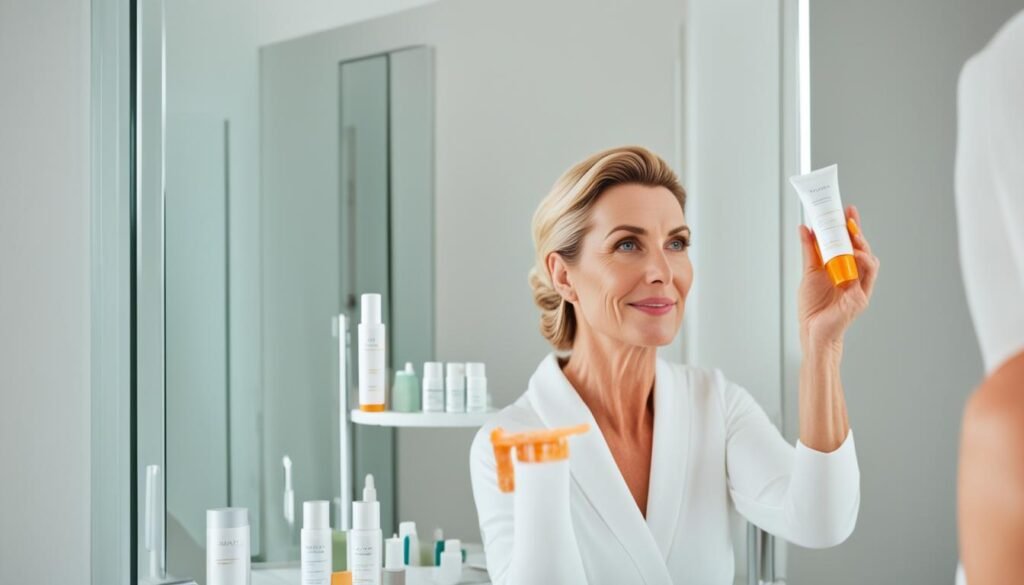
When it comes to achieving maximum effectiveness from your anti-aging products, a consistent skincare routine and following dermatologist recommendations are key. Here are some essential tips to help you get the most out of your anti-aging regimen:
1. Use Products Consistently
Consistency is crucial when it comes to anti-aging products. Incorporate them into your daily skincare routine and use them as directed. This allows the active ingredients to work their magic and deliver long-term results. Keep in mind that anti-aging products require consistent use over time to see noticeable improvements in your skin.
2. Follow a Proper Skincare Routine
An effective skincare routine is the foundation for healthy and youthful-looking skin. Begin by cleansing your face twice a day to remove impurities and prepare your skin for the products that follow. Next, apply a toner to balance your skin’s pH level and help other products absorb better. Follow this with a serum or treatment that targets specific aging concerns, such as wrinkles or dark spots. Finish off your routine with a moisturizer to hydrate and protect your skin. Don’t forget to apply sunscreen as a final step in the daytime.
3. Give Products Time to Work
Patience is key when it comes to anti-aging products. It takes time for your skin to adapt and for the active ingredients to show their effects. Give your products at least six to eight weeks before expecting noticeable results. Avoid constantly switching products or adding new ones to your routine too quickly, as this can disrupt the effectiveness and hinder your progress.
“Consistency, a proper skincare routine, and giving products time to work are essential for maximizing the effectiveness of anti-aging products.” – Dr. Emily Johnson, Dermatologist
By incorporating these tips into your skincare routine, you can enhance the effectiveness of your anti-aging products and achieve the best possible results for your skin.
| Tips for Maximizing Effectiveness | Skincare Routine | Dermatologist Recommendations |
|---|---|---|
| Use products consistently | Cleanse, tone, treat, moisturize | Follow product instructions |
| Follow a proper skincare routine | Give products time to work | Avoid excessive product switching |
The importance of sunscreen as part of an anti-aging routine
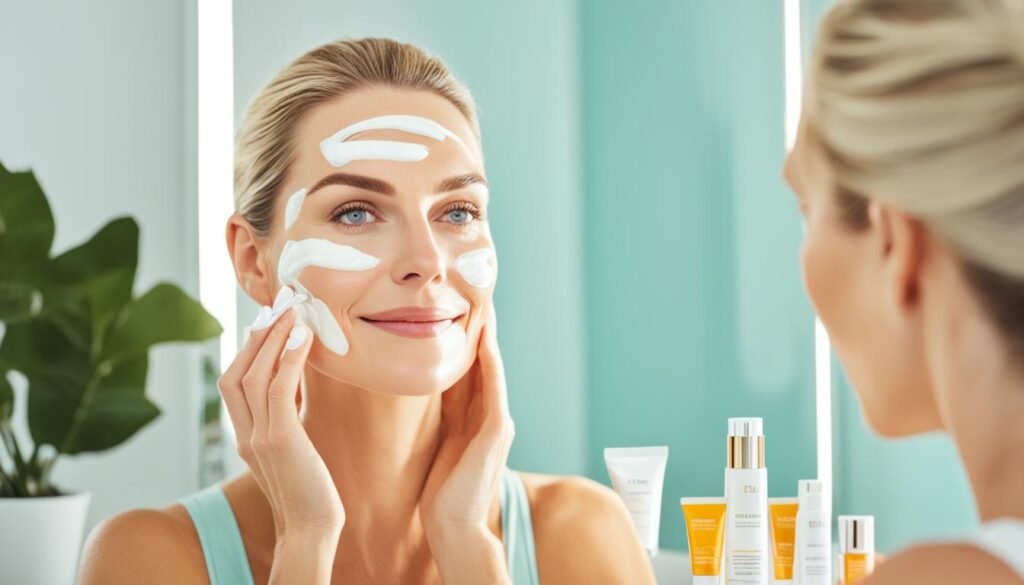
When it comes to maintaining youthful and healthy-looking skin, incorporating sunscreen into your daily skincare routine is non-negotiable. Sunscreen plays a crucial role in protecting your skin from further damage and warding off the visible signs of aging caused by sun exposure.
Did you know that the sun’s harmful UV rays are one of the leading factors contributing to premature aging? Over time, unprotected exposure to the sun’s rays can result in the formation of wrinkles, fine lines, age spots, and a loss of firmness and elasticity.
Applying sunscreen with a high Sun Protection Factor (SPF) is essential to shield your skin from both UVA and UVB rays. UVA rays penetrate deep into the skin, causing long-term damage, while UVB rays primarily affect the outermost layers, leading to sunburns and immediate skin damage.
By incorporating sunscreen into your anti-aging routine, you create a protective barrier between your skin and these harmful rays. This barrier helps to prevent further damage to your skin, allowing it to maintain its youthful appearance and reducing the risk of developing visible signs of aging.
Remember, sun protection is not just for sunny days or when you’re at the beach. The sun’s powerful rays can penetrate through clouds and even windows, so it’s crucial to wear sunscreen every day, regardless of the weather or your activities.
To further emphasize the importance of sunscreen, here is a table highlighting its key benefits:
| Benefits of sunscreen |
|---|
| Protects against harmful UVA and UVB rays |
| Prevents the formation of wrinkles and fine lines |
| Reduces the risk of age spots and uneven skin tone |
| Helps maintain skin’s firmness and elasticity |
| Minimizes the risk of skin cancer |
| Can be used as a standalone product or as a base for makeup |
As you can see, sunscreen offers much more than just sun protection. It acts as a shield against the aging effects of the sun and contributes significantly to the overall health and appearance of your skin. Make sure to choose a broad-spectrum sunscreen with an SPF of 30 or higher and apply it generously to all exposed areas of your skin, including your face, neck, and hands.
Don’t wait until you start noticing visible signs of aging to start taking sun protection seriously. Remember, prevention is key, and by making sunscreen a priority in your anti-aging skincare routine, you can help maintain youthful and radiant skin for years to come.
Conclusion
In conclusion, sunscreen is a key component in preventing skin aging and maintaining a youthful complexion. By providing protection against the harmful UV rays of the sun, sunscreen helps to minimize the risk of sun damage, including sunburns, wrinkles, and dark spots. Incorporating a daily skincare routine that includes sunscreen and moisturizer is crucial for maintaining healthy, rejuvenated skin.
When it comes to addressing specific aging concerns, it is important to choose targeted products that cater to these needs. Whether it’s targeting wrinkles, dark spots, or other signs of aging, using specialized anti-aging products can yield more effective results.
However, it is essential to have realistic expectations when using anti-aging products. While they can provide significant improvements to the skin’s appearance, instant or drastic changes should not be expected. Consistency in product usage, following a proper skincare routine, and considering one’s skin type are key factors in maximizing the effectiveness of anti-aging products.
In summary, incorporating sunscreen, moisturizer, and targeted anti-aging products into a daily skincare routine, along with realistic expectations and considerations for individual skin types, can help achieve optimal skin rejuvenation. By taking these key takeaways into account, individuals can proactively protect their skin from aging and maintain a youthful appearance.
FAQ
What are the most important benefits of sunscreen in anti-aging skincare?
Sunscreen is crucial in preventing skin aging as it effectively blocks harmful UV rays, reduces the risk of sunburns and skin cancer, and minimizes the visible signs of aging such as wrinkles, brown spots, and visible blood vessels.
How do UV rays damage the skin?
UV rays, particularly UVA and UVB, damage the skin by penetrating into the deeper layers and damaging the top layer of the skin known as keratinocytes. Prolonged exposure to UV rays can lead to actinic keratosis, causing the skin to become red, rough, and scaly.
What is the importance of sunscreen in preventing skin aging?
Sunscreen plays a vital role in preventing skin aging by protecting against harmful UV rays. Regular use of sunscreen helps protect the skin from further damage and prevents the worsening of existing signs of aging.
Why is sunscreen and moisturizer important in anti-aging skincare?
Dermatologists recommend using sunscreen and moisturizer as the two most effective anti-aging products. Sunscreen protects the skin from UV damage, while moisturizer helps to minimize fine lines and keep the skin hydrated.
Should I use targeted products for specific aging concerns?
It’s best to focus on one specific aging concern, such as wrinkles or dark spots, when selecting anti-aging products. This allows for targeted treatment and better results. No single product can address all signs of skin aging.
How do I choose products for my skin type?
Selecting products formulated for your specific skin type ensures the best results. For oily skin, choose moisturizers designed for oily skin, and for sensitive skin, look for products labeled as hypoallergenic and non-comedogenic to prevent acne.
What should I expect from anti-aging products?
It’s important to have realistic expectations when using anti-aging products. Exaggerated claims of instant results or complete reversal of aging signs are often too good to be true. Products labeled as clinically proven have been tested on consumers but may not have undergone FDA clinical trials.
Are there affordable options for effective anti-aging products?
Effective anti-aging products come in various price ranges. While it’s human nature to believe that more expensive products yield better results, there are affordable options that can deliver significant improvements to the skin’s appearance.
How can I maximize the effectiveness of anti-aging products?
Dermatologists provide tips for maximizing the effectiveness of anti-aging products, such as using them consistently, following a proper skincare routine, and giving products time to work before expecting noticeable results.
How important is sunscreen in an anti-aging routine?
Sunscreen is a crucial component of any anti-aging routine. Regular use of sunscreen helps protect the skin from further damage and prevents the worsening of existing signs of aging.
What are the key takeaways for anti-aging skincare?
Incorporating sunscreen and moisturizer into a daily skincare routine, considering skin type when choosing products, having realistic expectations, and maximizing the effectiveness of products are key factors in achieving optimal skin rejuvenation.


